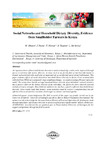Social Networks and Household Dietary Diversity, Evidence from Smallholder Farmers in Kenya.

View/
Date
2018Author
Mbugua, M.
Nzuma, J.
Muange, Elijah
Njuguna, M.
Metadata
Show full item recordAbstract
An important driver of household dietary diversity is nutrition knowledge which can be improved through
access to nutrition information. However, in many rural areas, formal flow of nutrition information is
limited, and social networks could play an important role as an informal source of such information. This
paper evaluates effects of social network on household dietary diversity in Kenya. Cross sectional data
collected from 198 farmers using multi stage sampling technique, was analysed using a Poisson regression
model. The results show that the average household dietary diversity of an individual’s network members
has a positive effect on the dietary diversity of the individual. The effects are more when the network
includes at least a strong tie. Household size and farm size also have a positive effect on household dietary
diversity. These results imply that farmers’ social networks could be used as a complementary tool for
effective delivery of nutrition education which targets to enhance nutritional quality.
Acknowledegment: Acknowledgements The field research of this paper was jointly carried out by the
University of Nairobi, University of Gottingen and Africa Harvest Biotech Foundation International. The
authors warmly acknowledge the Germany Federal Ministry of Food and Agriculture for funding this study
through Agriculture and Dietary Diversity in Africa (ADDA) project (grant number ADDA-UGOE/UoN:
2813FSNU01) . Last but not list, our gratitude goes to Theda Godeke (University of Gottingen) for her
support and guidance through the field research.
